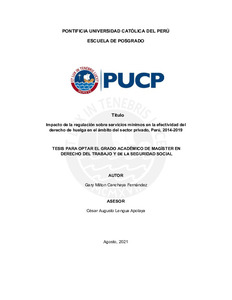| dc.contributor.advisor | Lengua Apolaya, César Augusto | |
| dc.contributor.author | Canchaya Fernández, Gary Milton | |
| dc.date.accessioned | 2021-12-09T15:43:34Z | |
| dc.date.available | 2021-12-09T15:43:34Z | |
| dc.date.created | 2021 | |
| dc.date.issued | 2021-12-09 | |
| dc.identifier.uri | http://hdl.handle.net/20.500.12404/21108 | |
| dc.description.abstract | El análisis de las comunicaciones de huelga del sector privado y de alcance nacional
presentadas durante el periodo 2014-2019 refleja que el principal motivo para que
la Autoridad Administrativa de Trabajo declare su improcedencia es la inobservancia
al requisito de la nómina para servicios mínimos. A partir de ello, el objetivo de la
presente tesis es determinar en qué medida la intervención del Estado en la
regulación de los servicios mínimos impacta en el ejercicio efectivo del derecho de
huelga en el Perú. Así, lejos de sostener que la afectación al ejercicio efectivo del
derecho de huelga se asienta en la actuación del órgano calificador, se concluye
que la dificultad para el cumplimiento de este requisito radica en el margen de
discrecionalidad que admite la normatividad de los servicios mínimos, el doble
control que se impone a la nómina, y la ausencia de reglas sobre la determinación
del ámbito objetivo y subjetivo de los servicios mínimos. Esta situación deja en
evidencia no solo las reales posibilidades que tienen las organizaciones sindicales
para ejercer de manera efectiva el derecho de huelga, sino la vulnerabilidad en la
que se encuentran los trabajadores por efecto de la posición asumida por el Tribunal
Constitucional y la Corte Suprema respecto al poder sancionador del empleador
ante las inasistencias derivadas de la comunicación de huelga declarada
improcedente. De este modo, el autor propone (i) reestructurar el doble control de
los servicios mínimos, (ii) añadir reglas para cubrir el vacío normativo referente a las
técnicas de determinación del ámbito objetivo de los servicios mínimos, (iii) dotar
claridad a la obligación legal de garantizar los servicios mínimos, y (iv) establecer
criterios que coadyuven a las organizaciones sindicales a confeccionar la nómina
para los servicios mínimos, según su ámbito de representación. | es_ES |
| dc.description.abstract | The analysis of the strike communications from the private sector and of national
scope presented during the 2014-2019 period reflects that the main reason for the
Labor Administrative Authority to declare their inadmissibility is the non-observance
of the minimum service payroll requirement. Based on this, the objective of this
thesis is to determine to what extent the intervention of the State in the regulation of
minimum services impacts on the effective exercise of the right to strike in Peru.
Thus, far from sustaining that the effect on the effective exercise of the right to strike
is based on the performance of the qualifying body, it is concluded that the difficulty
in complying with this requirement lies in the margin of discretion that the minimum
services regulations allow, the double control that is imposed on the payroll, and the
absence of rules on the determination of the objective and subjective scope of the
minimum services. This situation reveals not only the real possibilities that trade
union organizations have to effectively exercise the right to strike, but also the
vulnerability in which workers find themselves as a result of the position assumed by
the Constitutional Court and the Supreme Court regarding to the sanctioning power
of the employer in the event of absences derived from the communication of a strike
declared inadmissible. In this way, the author proposes (i) restructuring the double
control of minimum services, (ii) adding rules to cover the regulatory gap regarding
the techniques for determining the target scope of minimum services, (iii) providing
clarity to the legal obligation to guarantee minimum services, and (iv) establish
criteria that help union organizations to prepare the payroll for minimum services,
according to their scope of representation. | es_ES |
| dc.language.iso | spa | es_ES |
| dc.publisher | Pontificia Universidad Católica del Perú | es_ES |
| dc.rights | info:eu-repo/semantics/openAccess | es_ES |
| dc.rights.uri | http://creativecommons.org/licenses/by/2.5/pe/ | * |
| dc.subject | Huelgas y paros-- Legislación--Perú | es_ES |
| dc.subject | Sindicatos--Perú | es_ES |
| dc.subject | Derecho laboral--Legislación--Perú | es_ES |
| dc.title | Impacto de la regulación sobre servicios mínimos en la efectividad del derecho de huelga en el ámbito del sector privado, Perú, 2014-2019 | es_ES |
| dc.type | info:eu-repo/semantics/masterThesis | es_ES |
| thesis.degree.name | Magíster en Derecho del Trabajo y de la Seguridad Social | es_ES |
| thesis.degree.level | Maestría | es_ES |
| thesis.degree.grantor | Pontificia Universidad Católica del Perú. Escuela de Posgrado | es_ES |
| thesis.degree.discipline | Derecho del Trabajo y la Seguridad Social | es_ES |
| renati.advisor.dni | 40171568 | |
| renati.advisor.orcid | https://orcid.org/0000-0001-6385-3199 | es_ES |
| renati.author.dni | 46544342 | |
| renati.discipline | 421327 | es_ES |
| renati.juror | Boza Pro, Guillermo Martin | |
| renati.juror | Lengua Apolaya, Cesar Augusto | |
| renati.juror | Vilchez Garces, Lidia Josefina | |
| renati.level | https://purl.org/pe-repo/renati/level#maestro | es_ES |
| renati.type | https://purl.org/pe-repo/renati/type#tesis | es_ES |
| dc.publisher.country | PE | es_ES |
| dc.subject.ocde | https://purl.org/pe-repo/ocde/ford#5.05.01 | es_ES |






